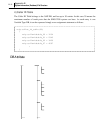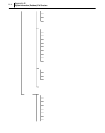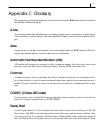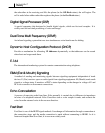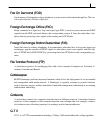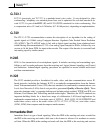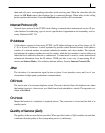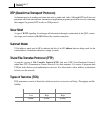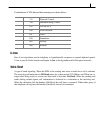
them and calls out a corresponding subscriber at the receiving end. When the subscriber lifts the
phone (in Off Hook status) the telephone line is connected through. When either of the calling
parties replaces the handset, it becomes On-Hook status, and the call is terminated.
Internet ProtocolInternet Protocol ((IPIP) )
Network layer protocol in the TCP/IP stack offering a connectionless internetwork service. IP pro-
vides features for addressing, type-of-service specification, fragmentation and reassembly, and se-
curity. Defined in RFC 791.
IP AddressIP Address
32-bit address assigned to hosts using TCP/IP. An IP address belongs to one of five classes (A, B,
C, D, or E) and is written as 4 octets separated by periods (dotted decimal format). Each address
consists of a network number, an optional subnetwork number, and a host number. The network
and subnetwork numbers together are used for routing, while the host number is used to address an
individual host within the network or subnetwork. A subnet mask is used to extract network and
subnetwork information from the IP address. CIDR provides a new way of representing IP ad-
dresses and Subnet Masks. Also called an Internet address. See also Internet Protocol (IP).
Jitter Jitter
The deviation of a transmission signal in time or phase. It can introduce errors and loss of syn-
chronization in high-speed synchronous communications.
OffOff--Hook Hook
The active state of a customer telephone circuit. The term is derived from old telephone sets where
the handset (receiver), when in use, was lifted from a hook attached to a switch. The opposite con-
dition is On-Hook.
OnOn--HookHook
Means the handset of a telephone is replaced (down). The connection is closed and the bell is in
standby mode.
Quality of ServiceQuality of Service ((QoSQoS))
The quality of the services that are provided. When specified values of QoS variables are satisfied,
it indicates that the quality of the corresponding service is satisfactory.



